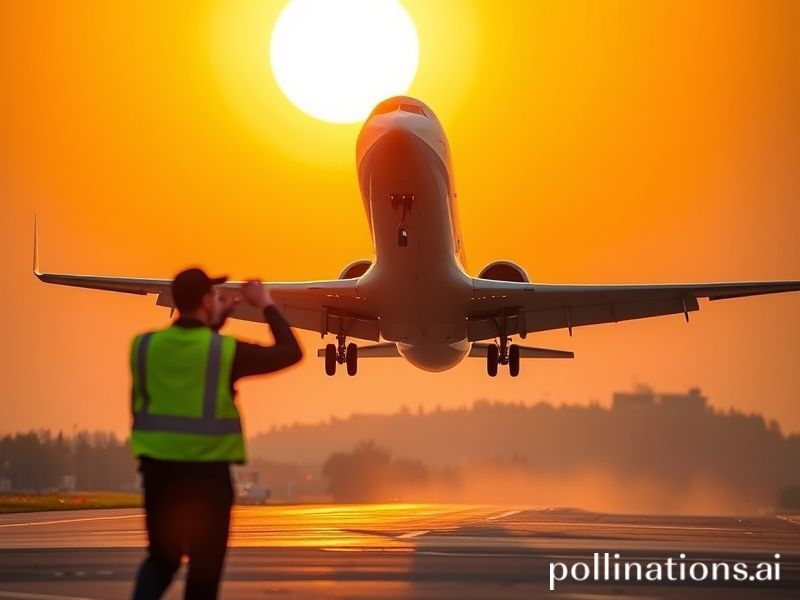Global Flight Follies: How Humanity Learned to Fly, Complain, and Ignore the Bill Together
The Miracle of Flight, or How to Sit in a Tin Can and Pretend It’s Progress
By our man in seat 47B, somewhere between Doha and existential dread
Gravity, once the universe’s way of telling us to stay humble, has been thoroughly overruled. Every three seconds, somewhere on the planet, 300 tons of aluminum and hope shrug off Isaac Newton and claw their way into the troposphere. The miracle is celebrated with lukewarm Chardonnay and a €9 sandwich that tastes like remorse.
From the Silk Road to the jetway, the human race has always prized one commodity above all others: speed. We traded camels for 747s, dysentery for deep-vein thrombosis, and yet we congratulate ourselves on having “shrunk the globe.” In truth, we merely enlarged the queue at immigration.
Take Dubai International, the world’s busiest long-haul hub, where 90 million souls per year perform the modern hajj to Duty Free. Here, national stereotypes are confirmed in real time: the French cutting lines with Gallic indifference, the Americans wearing shorts in 18-degree air-conditioning, the Chinese tourists photographing price tags as if they were rare butterflies. The airport is a petri dish of geopolitics where your seatmate might be a Syrian refugee, a Nigerian oil executive, or a TikTok influencer from Finland—all equally enraged by the Wi-Fi password.
Meanwhile, 35,000 feet below, the planet burns politely. Aviation accounts for roughly 2.5 percent of global CO₂ emissions, a figure the industry prefers to express as “only” and “improving,” much like a drunk driver bragging that he’s down to six beers a night. The European Union now taxes jet fuel; the United States pretends to read the memo; China builds another runway. Everyone agrees something must be done—preferably by someone else, next quarter.
The pandemic briefly grounded us, a planetary time-out that cleared the skies so thoroughly that meteorologists could finally hear themselves think. For a few strange months, the contrails vanished, birds returned to flight paths, and we learned that our grandparents were right: silence really is golden. Then the bailouts arrived, and the miracle resumed, louder and more carbon-intensive than ever. Airlines called it “revenge travel”; psychologists called it “coping”; the climate called it “suicide with extra legroom.”
Yet the symbolism endures. In Kyiv, evacuation flights ferry mothers and children westward while inbound cargo bays brim with Javelin missiles—same aircraft, different payloads. Over the Pacific, Taiwanese fighter jets intercept Chinese bombers, each side practicing the choreography of a war everyone hopes will remain theoretical. In the Persian Gulf, superjumbos packed with Bangladeshi laborers land at 3 a.m. to build stadiums that will host matches for fans who arrived on other superjumbos. The circle of life, sponsored by Boeing.
Economists insist aviation is indispensable; 87 million jobs, $3.5 trillion, yada yada. They rarely mention the invisible export: inequality. The top 1 percent of flyers generate more than half of all emissions, while the bottom 90 percent will never see the inside of a terminal that isn’t on a cleaning shift. Your carbon footprint, dear reader, is someone else’s barefoot sprint across a tarmac in Mogadishu.
And still we queue, boarding pass in hand, Instagram filter pre-selected. We buckle up to hurtle through the stratosphere in defiance of every instinct our ancestors evolved, trusting two things: the engineering prowess of underpaid technicians and the forbearance of unseen strangers not to weaponize our toothpaste. Somewhere above Greenland, the captain switches off the seat-belt sign; somewhere below, a glacier obligingly calves into the sea. Coincidence, surely.
When we land, we applaud—not the pilot, but ourselves—for having once again cheated the reaper. Then we shuffle into an Uber, confident that tomorrow’s flight will be different, greener, quieter. It won’t be, of course. The only thing lighter than air is our collective denial.
So here’s to flight: mankind’s greatest triumph of physics over common sense, a paradox wrapped in a foil tray of rehydrated lasagna. Fasten your seat belts, return your tray tables to the upright position, and remember—if you look out the left window, you can almost see the point at which hubris becomes altitude.







